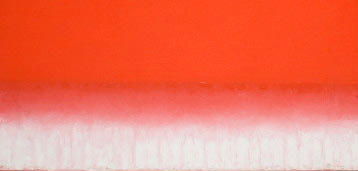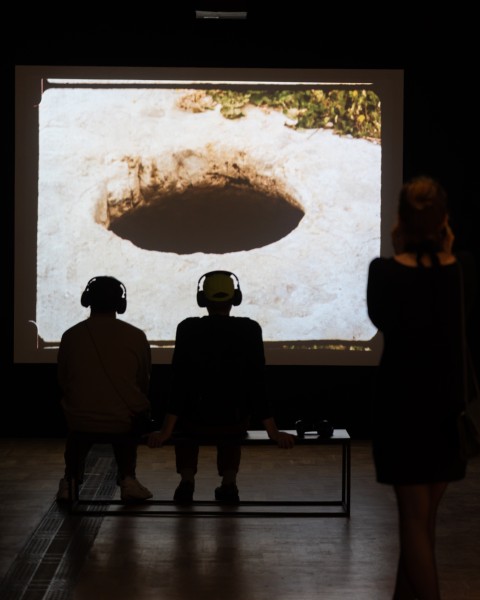Potential History Symposium
Zachęta – National Gallery of Art
free admission
Sympozjum będzie tłumaczone na język polski i PJM
Weekend international symposium with participation of artists, curators and invited speakers who have been engaged for years in both theoretical and practical fields (artistic, curatorial, academic, activist) of potential history. They all have worked at the complex and creative intersections of topographies, methodologies, heritages, languages and politics. Drawing on this experience, they will share their research and engagement and will discuss possible scenarios of collaboration and solidarity, refusal and resistance to dominant narratives, affects and aesthetics in the face of violent forms of feeling and representation.
Programme
1 February 2025
2 p.m. Curators’ introduction to the exhibition and guided tour in English
3–6 p.m. Presentations followed by discussion
Katarzyna (Kasia) Bojarska, intro
Basma al-Sharif on necessity of displacements and reversals in historical, political and artistic narratives, on the right to look at the landscape and countering the archival surveillant gaze. (presentation of the work on Ouroboros, 2017)
Ana Teixiera Pinto on the White West project and on the necessity of facing fascism and imperial violence both in theory and in artistic, curatorial and social practice; on the need for a decolonial debate both in academia and in art institutions, as well as on the limits of repair.
short break
Post Brothers on researching the potential histories of Białystok and the practices and networks of anarchism in the region as well as on artistic and curatorial reconstructions.
Aleksandra Szczepan and Robert Kusek (Potential History of ECE group members) on researching potential history of Central and Eastern Europe, the approaches practiced, the methodologies applied and the process of unlearning regional histories and identities.
2 February 2025
12.15 p.m. guided tour in Polish
13.30 p.m. guided tour in English
3–6 p.m. Presentations followed by discussion
Noor Abed, on approaching history as a permanent present tense, a collective and imaginative act that resists imposed scenarios of everyday lives and imprinted forms of togetherness.
Michał Pospiszyl, on what stories do the Eastern European wetlands tell and how can these stories be heard and embraced today as well as what could be their political import within broader framework of decolonization of knowledge.
Anna Łazar, on curating in the post-soviet context, on the engagement with multiple perspectives and languages on imperialist history (and art history) of the region, as well as on the challenges of deconstructing histories through exhibitions.
short break
Andrea Průchová Hrůzová, on her involvement in the collective research on discourses of decolonization and racial (in)justice in the Central and Southeast Europe and the potential risks of academic and artistic activism.
Monika Bobako, on her research on the genealogies of peripheral whiteness and the relationship between the history and memory of Nazi genocide and the history of Palestinians in Polish academia and in social life, on whether the concept of potential history may allow us alternative forms of engagement with past and present violence.
participants
curators: Maria Brewińska, Joanna Kordjak, Katarzyna Kołodziej-Podsiadło
Noor Abed is a Palestinian interdisciplinary artist and filmmaker. Her practice examines notions of choreography and the imaginary relationship of individuals, creating situations where social possibilities are both rehearsed and performed.
Basma al-Sharif is a Palestinian artist/filmmaker whose work explores cyclical political histories and conflicts. In films and installations that move backward and forward in history, between place and non-place, she confronts the legacy of colonialism through satirical, immersive, and lyrical works.
Ana Teixeira Pinto is a writer and cultural theorist based in Berlin. She is a guest professor at the Academy of Fine Arts Nuremberg (AdBK) and a theory tutor at the Dutch Art Institute. Her writings have appeared in publications such as Third Text, Afterall, e-flux journal, Manifesta Journal, and Texte zur Kunst. She is the editor of a book series On the Antipolitical published by Sternberg Press. Together with Kader Attia and Anselm Franke, she organized the conference and podcast series The White West: Whose Universal, which took place at HKW Berlin, and she was a member of the 2022 Berlin Biennial artistic team.
Andrea Průchová Hrůzová is a researcher at the Institute for Contemporary History at the Czech Academy of Sciences and an associate professor of visual, cultural, and media sociology at the Department of Sociology at the Faculty of Social Sciences at the Charles University in Prague. She is a founder of the visual research platform Fresh Eye and works in the fields of historical and digital visual culture and memory studies. Her research work has been published in journals like the International Journal of Politics, Culture, and Society, Visual Studies, and European Journal of Cultural Studies and in international publishing houses. She has translated Berger’s Ways of Seeing, co-translated WJT Mitchell’s Picture Theory, Nicholas Mirzoeff’s How to See the World, and Jonas Mekas’ Scrapbook of the Sixties into Czech. She is the author of V zajetí obrazů. Vizuální politika 21. století [Caught by images. Visual politics of the 21st century] (2024), and editor of Public Narratives of Decolonization and Racial (In)Justice in Central and Southeast Europe. Colonies and Enemies, Riots and Patriots (forthcoming in 2025).
Michał Pospiszyl, historian, Assistant Professor at the Institute of Political Studies of the Polish Academy of Sciences. Author or co-author of three books, including (in Polish) Zatrzymać historię. Walter Benjamin i mniejszościowy materializm [Stopping history. Walter Benjamin and the minoritarian materialism] (2016). Winner of an IWM scholarship in Vienna and finalist of the Barbara Skarga Prize. He is currently working on a book on the social and environmental history of Eastern European wetlands. He has recently published an article on this topic in Environmental History. He lives in the Białowieża Forest.
Robert Kusek is Associate Professor at the Department of Comparative Studies in Literature and Culture, Faculty of Philology, as well as Head of Research Centre for Transnational Literary Studies at the Jagiellonian University in Krakow. His research interests include life writing genres, the contemporary novel in English, queer heritage, as well as a comparative and transnational approach to literary studies. He is the author of two monographs and several dozen articles published in books and academic journals. He was a researcher in a number of Polish and international projects – currently he is a principal investigator in the National Science Centre funded project entitled (Un)accidental Tourists: Polish Literature and Visual Culture in South Africa in the 20th and 21st Centuries.
Aleksandra Szczepan, is a post-doctoral researcher in the project “Adjustment and Radicalization: Dynamics in Popular Culture(s) in Eastern Europe” at the University of Potsdam. She is a literary scholar, a co-founder of the Research Center for Memory Cultures at the Jagiellonian University in Kraków. She has also been engaged as a researcher and interviewer in oral history projects undertaken by the U.S. Holocaust Memorial Museum in Poland, Spain, and Kazakhstan. She has received scholarships from various institutions, including the USHMM, New York Public Library, Vienna Wiesenthal Institute for Holocaust Studies, the European Holocaust Research Infrastructure, and the Polish National Science Centre. She is currently working on a book on forms of solidarity in Polish culture from the 19th century until now.
Post Brothers is a critical enterprise that includes Matthew Post, an enthusiast, word processor, educator, and (co)dependent curator often engaged in artist-oriented projects or occupying the secondary information surrounding cultural production. From 2016–2019, Post Brothers was the curator at Kunstverein München, Germany, and from 2021–2023, they were an Associate Professor at the Royal Danish Academy of Fine Arts, Copenhagen. They have curated numerous exhibitions and projects across the world, and regularly publish essays in artist publications, exhibition catalogues, and art and cultural journals. They also participate in exhibitions with text-based and performative contributions, and lecture in art and educational contexts across Europe. Born in Los Angeles, they live in Kolonia Koplany, a small village near Białystok in eastern Poland. With Katarzyna Różniak-Szabelska, they co-curated the exhibition In the Beginning Was the Deed (Arsenał Gallery, Białystok, 2021), devoted to the potential histories of Białystok and the practices and networks of anarchism in the region.
Anna Łazar, curator of the international artistic cooperation program Free Word within the framework of Gdańsk City of Literature, member of the Women’s Archive team. Author of texts and translator. Editor of the book on art by Aleksandra Kubiak I Will Make a Heart (2022). Curator of contemporary art exhibitions Look at this moment as it vibrates (Arsenał Gallery in Białystok, 2024), Murder to Be Accepted (Berlin, 2022), In what a beautiful place we are (Muzeum Sztuki in Łódź, 2022). She has worked in public diplomacy at the Ministry of Foreign Affairs as deputy director and acting director at the Polish Institutes in Kyiv (2008–2014) and St. Petersburg (2015–2018) and as curator at the Museum of Art in Łódź (2021–2022). Member of the Polish section of AICA.
Monika Bobako philosopher and gender studies scholar from Adam Mickiewicz University in Poznań. Her research interest include questions of power dynamics in the post-colonial world, social inequality, peripherality, race and racism, including islamophobia and anti-semitism. She is the author of Islamofobia jako technologia władzy. Studium z antropologii politycznej [Islamophobia as a technology of power. A study in political anthropology] (2017) and Demokracja wobec różnicy. Multikulturalizm i feminizm w perspektywie polityki uznania [Democracy in the face of difference. Multiculturalism and feminism in the perspective of the politics of recognition] (2010). Currently she is involved in a research project entitled Genealogies of Peripheral Whiteness. Polish Identities in the Perspective of Racialisation Theory (National Centre for Science grant).
Curator of the programme: Katarzyna (Kasia) Bojarska, Assistant Professor in the Department of Cultural Studies of the SWPS University in Warsaw. Founder and head of Center for Comparative Research on Memory Cultures (CCRMC). Co-founder and editor of View. Theories and Practices of Visual Culture journal. Scholar of visual culture, contemporary art and memory cultures. Translated among others Michael Rothberg’s Multidirectional Memory. Remembering the Holocaust in the Age of Decolonization (2016). Author of a book Wydarzenia po Wydarzeniu: Białoszewski – Richter – Spiegelman [Events after the event: Białoszewski – Richter – Spiegelman] (2012). Editor and translator (among others) of Ernst van Alphen’s Criticism as Intervention: Art, Memory, Affect book (Polish edition 2019). Member of the Polish section of AICA.
-
19.10.2024 – 02.02.2025POTENTIAL HISTORIES
The works presented in the exhibition — films, installations and objects created in recent years by several artists — are united by the themes of appropriation, instrumental treatment and the reclaiming of history, presented in the context of current political tensions. These concern regions of recent and ongoing conflict marked by the legacy of colonialism and of Russian imperialism: the Middle East, North Africa, and Eastern Europe.
Zachęta – National Gallery of ArtZachęta

